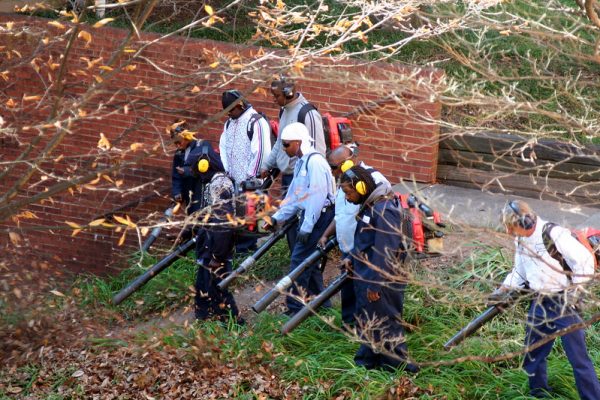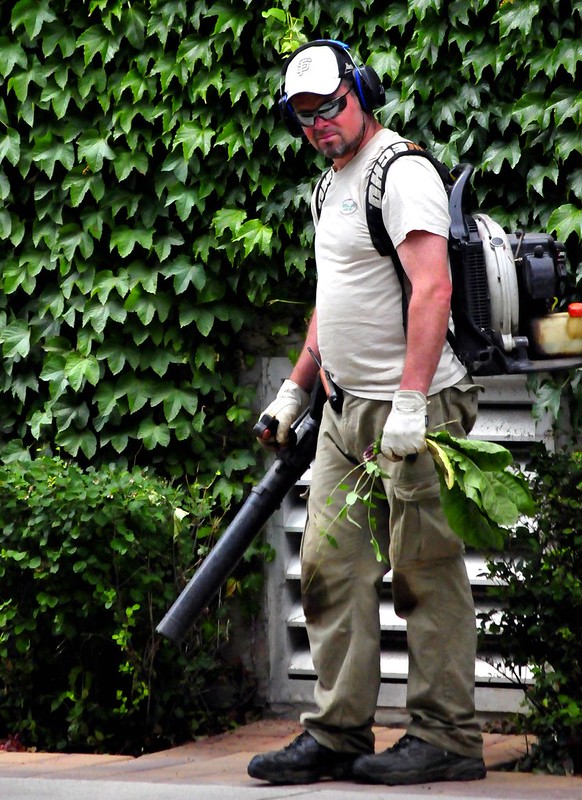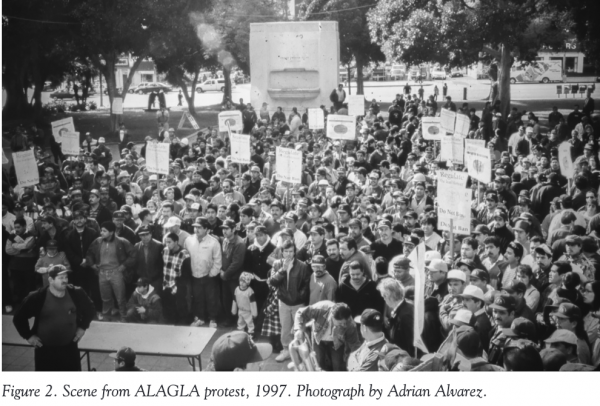The leaf blower is one of the most hated objects in the modern world. They’re loud, they pollute, and… how important is a leafless lawn anyway? In a lot of towns and cities, the gas-powered leaf blower has been banned. In others, there are strict guidelines on where and when they can be used. But in Los Angeles, California, the leaf blower has never gone quiet.

In 2024 the state of California banned the sale of gas-powered leaf blowers, but this most recent development is just the latest shot in the Los Angeles Leaf Blower Wars. This is a fight that goes back decades, and one that has kicked up questions about labor rights, environmental concerns, and ideas of beauty.
Thar They Blow
In 1970s Los Angeles, it was common for people to hose down their driveways. Homeowners, renters, and gardeners would wash dirt and leaves and whatever else out onto the street. But a serious drought in 1976 and 1977 spurred many Californians to start saving water, and stop hosing everything down all the time.
It was at this moment that Japanese company Echo debuted what they called the “clean-up machine.” Originally invented as a crop dusting device in 1947, it seemed to solve the problem perfectly: a drought-friendly way to move leaves and debris off your yard.
By 1989, some estimates say that about one million leaf blowers had been sold in America. While they were ubiquitous, they were also almost universally hated. Through the 1980s, facing pressure from home-owners and constituents in quiet neighborhoods, many city councils had introduced or passed outright bans on the leaf blower. From the start, Californian cities stood at the forefront of this war against the leaf blower, with the most high-profile ban in Southern California, Beverly Hills.
Despite all of their loudness and fumes, the leaf blower was also very fast at removing leaves from a yard. And for the people who were not just maintaining their own lawn, but many lawns, this speed was a big deal. In 1989 Jaime Aleman left his job in office supplies to start his own landscaping company. A landscaper often starts their business when an older gardener gives them a few houses – or clients. Through much of the 20th century, a lot of the gardeners in Los Angeles were of Japanese descent. But throughout the 80s and 90s that began to shift mostly to Latin American gardeners. Their circuit of clients became known as La Ruta (The Route).
More Leaf Blowers More Dollars
The difference between failure and success for a gardener is all about speed. They get paid per lawn and the margins are already small. Using a blower instead of a rake means they can work a bigger circuit of lawns in a single day. But as Aleman began his business and expanded La Ruta, tension had been building for almost a decade. Word began to spread through the community that the Los Angeles City Council was seriously considering a ban on gas-powered leaf blowers. Jaime saw this proposed ban as an obvious threat to his young business. And he started to ask around, looking for some advice on how to fight it.

Doctor Álvaro Huerta, now an associate professor in the Urban and Regional Planning department of Cal Poly Pomona, was a young Chicano activist from Boyle Heights in 1996. He had a small group of activist friends who took on some big issues, like getting UCLA to provide financial aid to undocumented students. Huerta agreed to help Jaime, and with a small group of friends and activists, sprung into action. The Association of Latin American Gardeners of Los Angeles, or ALAGLA, was born. ALAGLA’s opponents were no small adversary. It seemed a city-wide ban would soon be passed into law.
City council, however, hadn’t thought about who was on the other side of these blowers: people like Jaime Aleman. As a landscaper, he was understandably nervous about this crackdown on a tool he used every day. ALAGLA saw that their best chance was to flip public opinion, and began planning protests to attract the press. As more national and international news outlets covered the gardener’s protests, LA’s public perception of leaf blowers became a little more complex.

The gardeners, in turn, had a strong, simple message: this ban would make it hard for them to make a living. Any time somebody said anything in favor of the gardeners, the room erupted in applause. Ultimately, the city council voted down the substitute motion, instead deciding to vote on the single-line ordinance. When they brought up the ban on gas-powered leaf blowers it passed, easily, with 1



